Music Reviews
JAZZ & ME - Annette Gregory & Friends

Annette brings her show to the Buxton Fringe for the 5th year at the Green Man gallery. Her publicity tells us she is a familiar face in Festival Fringes and Jazz Clubs across the country and Annette’s website descriptions portray an egotism which really doesn’t describe the person fairly at all, though a degree of self assertiveness must be an advantage in promoting an artiste. In live concert her personality exudes warmth and sincerity. She projects the programme of jazz standards with positive feeling.
Tonight’s performance had a different emphasis to Annette’s usual show normally supported by a 4 or 5 piece band, but unavailability of the regular group left the show in the hands of a tasteful duo comprising Annette herself and versatile guitarist, John McKinley. Annette generously introduced her sparing partner as “poor John”, presumably referring to his daunting task of underpinning and cementing this evening’s show and likening his abilities to Joe Passalaqua, the legendary American guitarist who enhanced the performances of luminaries such as Oscar Peterson and Ella Fitzgerald. However the build up was not misplaced as together Annette and John formed a delightful tasteful duo delivering jazz at the top level.
The opening numbers, ‘Almost like being in love’ and ‘On a clear day’ had a tentative flavour with some phrases sounding rather clipped, occasionally compromising the flow. Normally the sound gap would be covered by other instrumentalists, however the set quickly settled down. ‘All the things you are’ and ‘East of the Sun’ started with the similar bossa introduction which John does so well and a sequence which lends itself so naturally to the guitar. ‘All the things…’ like several other numbers in the programme developed into a style of jazz, improvisatory from start to finish without actually stating the head tune. Later in the programme ‘In the wee small hours…’ a number in which they explored the rich chord sequence to the full again without a statement of the tune worked very well and much clever harmonisation to be applauded by jazz aficionados.
John's guitar impressive technique and command of the instrument was a vital component of the duo and his solo number, a development of the 12 bar blues, pulled out some imaginative riffs. Tonight’s all too short programme comprised songs which tended to gravitate to the same moderate tempo with a similar vaguely latin backing; but nothing wrong with that as it was all very effective, technically good and entertaining. The guitar solo was brilliant in ‘Street life’, a number well established in Annette’s repertoire.
An original by Annette, ‘Lonely’, a moving ballad recently recorded, is said to be drawing on inspiration from her late mother and she introduced some autobiographical snippets in the endearing commentary.
Annette has a lovely unmistakable voice and her ability to apparently effortlessly accurately pitch notes in chord extensions indicates a particular talented “ear” for jazz chords. For example the major 7th in ‘I’ve got you under my skin’ and accurately hitting the 9th and 13th in their version of ‘Night and Day’ seems to come naturally and adds a lovely piquancy. The use of the microphone as an expressive instrument may seem intuitive but Annette has perfected the technique of fine tuning volume and vocal tone, nicely demonstrated in her version of ‘Feelin’ good’.
I trust we hear more of Annette Gregory in Buxton in years to come.
Brian Lightowler
LIVE AND UNLOCKED - VociVoices
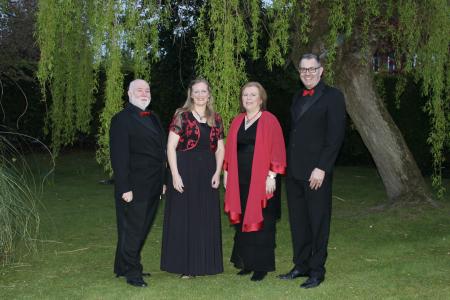
Voci Voices returned to the Buxton Fringe, giving their first live performance since lockdown. With a slightly changed line-up since their last appearance, Voci Voices are comprised of four classically-trained singers; Elizabeth Ambrose (Soprano), Isobel Jenkins (Mezzosoprano), Eric Cymbir (Tenor) and Simon Horsfield (Baritone).
In his introduction, Simon Horsfield promised an eclectic mix and this was certainly delivered in a varied programme of eighteen pieces which included arias, songs from musical shows and contemporary songs. In fact, the first three pieces, Gloria, Vivaldi’s most famous choral piece, What a Wonderful World, first recorded by Louis Armstrong, and You Are the Sunshine of My Life by Stevie Wonder, encapsulated this range.
Operatic pieces featured prominently in their repertoire: Au Fond du Temple Saint, often known as The Pearl Fishers’ Duet from Bizet’s opera of that name, La Vergine Degli Angeli from Verdi’s The Force of Destiny and Ai Nostri Monti Ritorneremo from Il Trovatore by Verdi were all delivered with great feeling and skill.
Gershwin’s Someone to Watch Over Me, which was originally written for the musical Oh, Kay but has been covered many times by different artists and the similarly much-covered Old Devil Moon from Finian’s Rainbow showcased the quartet’s amazing versatility. They are, however, equally at home with contemporary pieces and John Denver’s Perhaps Love and You Raise Me Up (which has been recorded by over a hundred artists and was a hit in this country for Westlife) were thoroughly enjoyed by the very appreciative audience.
Some pieces were sung as a quartet with fabulous harmonies, others as duets. As in previous years, the quartet were accompanied by the excellent Jonathan Ellis, and this talented pianist delivered an outstanding performance of Mozart’s Overture from The Marriage of Figaro.
This is the Moment from Jekyll and Hyde, provided an outstanding finale to a memorable performance.
It is a great pleasure having this talented quartet perform at the Fringe but, sadly, once again, this was their only performance.
Vernon McGarey
MUSIC FOR TWO GUITARS - The Roth Guitar Duo
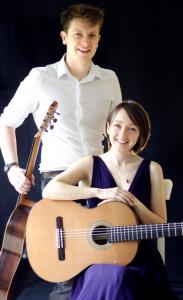
The Roth Guitar Duo of Sam Rodwell and Emma Smith formed in 2014 out of a shared love of chamber music realised while studying at the Royal Northern College of Music. Sam and Emma always strive to create interesting and varied programmes, ranging from Renaissance to newly commissioned and unpublished works. This was clearly evident at their recital on Tuesday 20th July at the United Reform Church, where the Roth Guitar Duo’s enjoyment of playing, coupled with their obvious musicality, supported a richly melodic recital, perfect for a hot and sunny July afternoon.
From their opening with ‘Farewell to Stromness’, by Peter Maxwell Davies, to ‘Homecoming’ - a piece written especially for the duo by Yvonne Bloor, the hour was packed with assured playing and a rich variety of melodies covering a broad spectrum, from ‘Concerto for Oboe and Strings in D minor’, by Alessandro Marcello/J.S. Bach - with its gently romantic second movement, to the technically demanding and hypnotic ’Nagoya Guitars’ by Steve Reich. Throughout, Sam and Emma played with technical prowess, and with the sensitivity needed to project the emotive content of the music to a highly appreciative Fringe audience.
Other pieces in their Buxton Fringe programme included: ‘Lo Que Vendra’, by Astro Piazzolla, ‘Sonatina Canonica’, by Mario Castenuovo-Tedesco, ‘Bad Boy’ - Toru Takemitsu, and ‘La Vida Breve’ by Manuel de Falla.
The duo have played at venues and festivals throughout the U.K. including: St-Martin-in-the-Fields, Buxton Pavilion Arts Centre, Cardiff Guitar Festival, Nanpantan Festival and Ribfest. They have also been frequent performers at Manchester’s Bridgewater Hall, for concert series such as ‘A Little Bite Music’, ‘Dig the City Festival’, Craig Ogden’s Big Guitar Weekend’ and ‘Bridgewater Introducing’ — which gives up and coming artists the chance to perform at the prestigious venue.
Tuesday the 20th of July was the Roth Guitar Duo’s only performance at this year’s Buxton Fringe, and hopefully they’ll be back next year, in the meantime if you have the opportunity to see them play elsewhere, then take it.
Curtis Bollington
ALWAYS FIND A SONG - Kaleidoscope Choir
This concert gave the Kaleidoscope Choir their first chance to sing together indoors for over 18 month. It was lovely for us in the audience to see a large choir, but the real delight was amongst the choir members themselves.
The opening songs, including the sea shanty, The Wellerman, about the boat that brought supplies to the whaling ships, showcased the choir’s wonderful harmonies, and it was amazing at how good they were, given that they have only rehearsed on Zoom when each choir member can only hear themselves and choir organisers Carol and Ian Bowns, but none of their colleagues.
Next up was a brand new song written by one of the choir members, Stephanie Billen, who had written the song while at the Chapel Arts writing group. It had been set to music before Carol and Ian Bowns had later adapted it into an a capella version. Carole and the choir then took us through the different layers of the song to show how it had been put together, which was a fascinating insight into the workings of a choral piece. Finally we heard the whole of “Dancing in the House of Wizards”, a lovely song well worth its place in the show.
Kaleidoscope Choir is supported by both Buxton International Festival and Buxton Opera House as part of their outreach programmes, so to highlight the first ever co-production between those two organisations, Stephen Sondhiem’s A Little Night Music, the choir gave us their version of the classic “Send in the Clowns”.
Fully into their stride, the choir performed songs ranging from Macedonia to South Yorkshire, an unusual version of Amazing Grace, called How Sweet the Sound featuring a counter melody, before finishing with a very rousing version of the folk song John Ball.
The choir were in fine voice throughout and thoroughly enjoyed singing together, which was a delight to see. The choir themselves thanked and payed tribute to Carol Bowns for keeping them going through eighteen awkward months without in person rehearsals. At the Fringe, we are glad you did, and you are welcome back anytime!
Stephen Walker
PROJECT ADORNO & DRUNK KEITH! ADVENTURES IN ELECTRO POP - Project Adorno

Project Adorno are regulars at the Fringe, I last saw them back in 2013, and there were new faces in the audience and on stage. Since then, there’s been a change in personnel and the project has slimmed down from a duo, leaving Praveen Manghani manning the fort. Drunk Keith was new to me but if you have been to the Fringe before, the chances are you have seen these chaps.
The show is billed as “Eclectic, amusing narratives on pop culture, critical theory and counter-cultural identity, fusing acerbic wit and perverse pop aesthetics of Mark E Smith and Momus. Low fidelity infidelities and leftfield Eighties/Nineties' electro pop musicality collide, celebrating postmodern eccentricity”, which is an awful lot to cram into 50 mins of pop songs.
Last night's show was split into two parts, with Drunk Keith taking centre stage first. It was a little hard to make out all the lyrics, which if you’re singing songs about pop culture and more, might seem to be an issue needing resolution. This didn’t stop members of the audience tapping toes and nodding heads.
The second part was Praveen/Project Adorno and as promised, there was much more electro-pop with a touch of whimsy, but mostly the regret and angst of teenage years. I'm sure you'll be able to spot their heroes in the pop world, I recognised influences from Dead or Alive, through Kraftwerk and beyond. There were some good tunes in there and they were undeniably Project Adorno.
In a previous review I’d said part of their charm was that they came over as “plucky amateurs who give it their best shot and aren't put off by the occasional spot of bad press”, and I think that still holds true. They’re game enough to give something they love doing a go in the public arena, something most people can’t do.
There’s a second show tonight (20th July) at the same venue. Get along and support them!
Ian Parker Heath
CLASSICAL GUITAR RECITAL - Richard Haslam
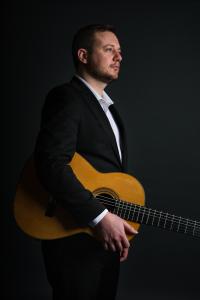
The description of Richard Haslam’s event described the concert as a ‘vibrant and colourful programme demonstrating the versatility and extensive range of the guitar'. Which was true, but also typically modest and self-effacing of Richard - no mention of his versatility, extensive range or talent! Coupled with the warm welcome and fine acoustics of Spring Bank Arts Centre, this was an ideal venue to experience a solo classical guitar recital.
The first piece - Fernando Sor’s ‘Introduction and Variations on a theme of Mozart’ - is an interpretation of a piece from The Magic Flute and I would guess uses the guitar’s harmonics to simulate Papageno’s magic bells. Richard’s tonal quality here was strikingly lucid and transparent.
Having started with a piece described on Wikipedia as ‘fiendishly difficult’, Richard’s programme moved on to works by two of the giants of Latin-America guitar composition, Paraguayan Agustin Barrios and Brazilian Heitor Villa-Lobos. The three movements of Barrios’ La Catedral suggest the experience of religious longing and solemnity inspired by the Montevideo Metropolitan Cathedral, whereas Villa-Lobos’ Etudes (described elsewhere as ‘quite difficult’, so a step down from ‘fiendishly difficult’) are exercises in technical ability coupled with rather sombre, dark and reflective moods ending with Etude 3 which has a more strident, assertive feel. Once again, these pieces highlighted the breadth of repertoire and technical skill which Richard brings to his performances.
The two contemporary pieces by Gary Ryan could not be more of a contrast - did I mention Richard’s versatility before? I felt that ‘Birds Flew Over the Spire’ cried out for a wistful, romantic lyric to match its warm city soundscape whereas ‘Benga Beat’ was a furious, vibrant, percussive work based on Kenyan popular music which was greeted with great enthusiasm by the audience. Richard described a video of this performance as his ‘lockdown project’. You can find it on YouTube just by searching ‘Richard Haslam Benga Beat’. If you want to get a flavour of this concert and Richard’s talent, I strongly recommend it you.
One of his final pieces is also on YouTube and once again could not be more of a contrast. I suppose the connection between Benga Beat and the works of John Dowland is probably popular dance music - in this case, Elizabethan jigs and galliards. After closing with Dowland's 'Forlorn Hope Fancy' it came as no surprise that Richard was invited back for an encore
This really was a rewarding evening and I imagine all those in the audience will be on the lookout for Richard’s future concerts in High Peak and beyond - as I will.
Graham Jowett
MIDNIGHT WINE - Chris Milner - Journeyman
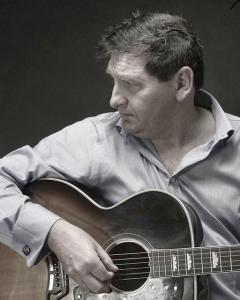
As somebody once sang, 'Wherever I hang my hat, that’s my home', and from the moment Chris Milner - Journeyman popped his hat and coat onto the stand on stage at the URC that’s exactly how it felt.
Chris has been a folk singer for over 50 years and the journeyman tag reflects the fact that he has played to audiences as far afield as Europe, Turkey and Africa whilst never losing touch with the British music scene and the folk clubs of West Yorkshire in particular. One of his guitars, his beloved Yamaha, is 50 years old and he shared the story of how he came by it, having decided to save up his paper run money as a child. There was a twist in this tale, just for us, and it was a feature of this particular gig that we felt we were being brought into his intimate circle. Being invited to bring in some wine definitely helped!
Experience counts and Chris never put a foot wrong as he strummed his two guitars and sang his lyrical, sometimes humorous songs on subjects including teenagers, romantic break up, vain successful singers, the deep comfort he has derived from his guitar and, in a particularly lovely, singalong-worthy finale, the changing role of women.
To echo a simple compliment that he particularly cherishes (from folk singer Dave Burland), 'Aye lad, nice take!'
Stephanie Billen
PIANO MEDITATIONS - Adrian Lord
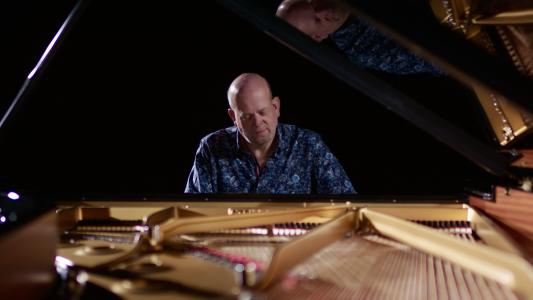
I'd loved Adrian Lord's on line Fringe entry last year so I had high expectations of his Saturday concert. I was not disappointed as his music was even better live.
Like many of our performers this year Adrian spoke about his lack of practice before a live audience and his joy at being back in front of an auditorium of real people. Judging by the reactions the audience were equally happy to hear and see him.
During the pandemic Adrian had set up a Facebook page and performed on line. He was inspired by the positive feedback he received to his concerts to write 'Piano Meditations', a set of pieces to bring a sense of calm to the listener. With evocative names such as Waves, Snowfall, Ascend and Evermore, I certainly felt lighter, calmer and totally relaxed after the concert.
As well as exerts from 'Meditations' Adrian also played four pieces from his debut album 'Journey - Twelve Romances for Piano' I admit I was moved at his lovely dedication of 'The Wedding' to his wife but more so for 'A Time to Remember' dedicated to the woman who set him on his journey as a pianist and composer at age six - his Mum. But my favourite from this selection has to have been 'Ripples' I closed my eyes and saw water running gently over rocks, falling through the leaves on trees and gently lapping waves.
The final set of music came from his second album ' Sky Blue Piano' which was the album I had loved last year and it was even better listening to it live. The sound that Adrian's fingers brought from the piano keys filled the Church lifting the audience and transporting us just for a little while to the beautiful landscapes of Scotland and the Lake District, the settings for much of Adrian's inspiration.
Regretfully this was his only performance at this year's Fringe, hopefully he will return next year and if he does make sure you don't miss him!
Carole Garner
JONATHAN PRAG CLASSICAL GUITAR - Jonathan Prag
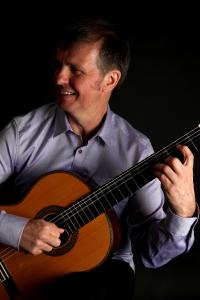
Classical guitarist Jonathan Prag tours throughout the UK and is a regular performer at the Edinburgh Festival Fringe. His performance work includes playing with The Ruskin Ensemble chamber music group, and he regularly performs on behalf of the charity ‘Music in Hospitals’. International touring includes appearances in Toronto and the Adelaide Fringe.
His latest programme, presented in the Purple Room of the United Reform Church on Hardwick Square East, offers a musical journey across Armenia, Russia, Spain, Orkney and more, embracing composers including Bach, Agustin Barrios and Peter Maxwell Davies; combining original music seamlessly alongside arrangements of the traditional.
The result is a texturally rich programme from across countries and three centuries, drifting comfortably from a protest against a prospective uranium mine by Peter Maxwell Davies, through a Prelude then a Fugue by JS Bach, and onwards with traditional dances, a Russian romance, and a flamenco inspired flourish at the end. Jonathan’s tremolo playing on the Agustin Barrios piece: ‘Una Limosna por el amor de Dios’ was particularly enjoyable.
Jonathan Prag's first concert of this Buxton Fringe was on 16 July, and in common with many performers, it was his first public concert in a staged area for eighteen months. Jonathan introduced each piece with just the right amount of background information to provide context. Played against a backdrop provided by the stained glass windows of the United Reform Church, the appreciative audience were also treated to the sight of a guitar they are unlikely to have seen before: a Manuel Contreras ‘Carlevaro’, of which only twenty are said to have been made. Distinctive due to having no sound hole and no curved upper side, it was designed for volume and a balanced tone across bass and treble, and it more than coped with church acoustics.
This concert offers a rich textural selection of music that is enjoyable and accessible, suitable for both seasoned listeners and those who would perhaps like to experience a live classical guitar performance for the first time.
Jonathan Prag studied drama at Bristol university. He began performing as an actor/musician, playing viola and guitar in a number of touring productions for theatre companies in the seventies and eighties. After touring in Poland, Canada, France and the UK, he decided to concentrate solely on the guitar. He is now a performer and teacher; teaching classical guitar in Southampton at Richard Taunton College, St Mary's Independent School, and Charlton House School.
Curtis Bollington
ART AND MUSIC - Hill & Friends
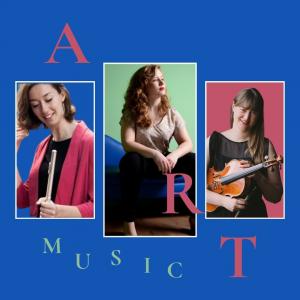
This was a Covid-19 dream, and what a delight that it was true, not fantasy. Here we were, a group of strangers, allowed to associate (duly masked and spaced) for a live performance on a mild summer evening, in the light-filled and art-filled Green Man Gallery, glasses of wine in hand if wished.
The event was called Art & Music, and, as their programme entry intriguingly suggested: ‘See music and hear art!’
The performers were Henrietta Hill (viola, a Buxton local) and her friends Rosie Bowker (flute) and Aleksandra Myslek (piano), a combination you could expect to fall pleasantly on your ear, and so it did. The music ranged from late 19th century to Covid-period modern, and of-the-moment improvisation inspired by the artworks displayed round the musicians. (This was the astonishing pleasure of the evening – How Do They Do That?! – particularly to those whose music-making is always from a written score.)
The trio of players started with Reynaldo Hahn’s Romanesque of 1910, mellow and delightful mingling of all three instruments winding round each other in ways to make the listener appreciate each in turn. This was followed by Karl Reinicke’s Undine Sonata for flute and piano of 1882, telling in music the story of the water nymph Undine, who married a mortal in order to gain a soul – a story that did not end well – musically enchanting in the 19th century romantic manner, displaying the flute in flowing watery form, but also in dramatic angst. The Barcarolle by Rhiannon Randle was written last year for its viola soloist Henrietta, a Covid project, being a seascape conveying winds and water in all moods, with echoes of English folksongs including the sea shanty Lowlands Away, and, the most obviously catchy, ‘Scarborough Fair’.
There followed the improvisations. This is something we know happens in jazz, rock & roll etc, but, cadenzas apart, not really in classical music. Here the players performed in response to several of the pictures placed round the platform. It was interesting and also moving to see how the three players watched the picture and each other, moving the music from one to another by some sort of (well practised) sympathy of intent and direction. One listener at least was much impressed.
They finished with their own arrangement from the original piano score of Ravel’s Sonatine of 1905. This is gloriously typical of Ravel at his most flowing, clearly enjoyed by all present, and very much by your reviewer.
The performance , the first of two that evening, wound up with hopes for more classical music in the Gallery in the future, a very happy thought, seconded by the musicians – who said it was a good acoustic to play in, as I also found it for listening. The musical pleasure was enhanced by the art works all round, especially the Buxton Spa Prize Exhibition 2021.
Ursula Birkett
ENGLISH SONGS AND MUSIC OF THE 17TH CENTURY - Mr Simpson's Little Consort
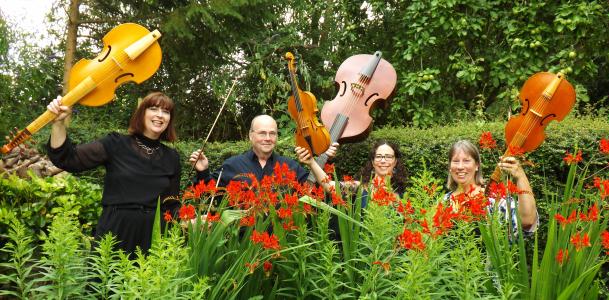
Eyam Parish Church in the middle of the famous historical village was the perfect setting for music of mainly the early Baroque period. It was the first concert given by the group Mr Simpson’s Little Consort since the outbreak of Covid. Much of the music played was written around the same time that Eyam suffered the terrible loss of life caused by another deadly infectious disease. They related many of the songs to issues brought about by Covid such as the sorrow caused by premature death and the necessity of travel restrictions, which has resulted in a greater appreciation of the beauty of the locality.
The group's name is derived from the leading 17th-century viol player, composer and teacher Christopher Simpson (1605-1669). They specialise in the performance of lute songs and instrumental pieces of the Renaissance and early Baroque.
All the group played the period instruments which included the viol and the recorder. They performed a large number of songs and instrumental compositions varying the mix of instruments according to the requirement of the piece performed.
They gave information about each item before it was played. Programmes were not given because of Covid but members of the audience could have the programme sent to them by email.
The concert opened with an unaccompanied welcoming song. The fact that the voice of the singer was heard before the singer appeared created an eerie effect sparking thoughts of ghosts from the past. The piece, I believe, was Pastime from Henry VIII Songbook.
Amongst my favourites were. ‘So beauty on the water stood’ by Alfonso Ferrabosco and the Purcell pieces, ‘Fairest Isle’ and ‘Evening Hymn’.
I think the 1605 traditional song ‘All in a Garden Green’, followed by a fantasia by John Jenkins which developed the melody of the song contrapuntally was a high point for me in the concert.
Another exceptionally interesting moment in the concert was when the entire group sang their individual parts whilst playing their instruments.
The group performed their pieces with conviction but allowing some lighter moments of humour to filter through. Their playing showed sympathy for each other’s playing, something particularly evident in imitative counterpoint passages. They were able to move skilfully from one instrument to another according to the needs of the piece performed.
Attending this concert was a thoroughly enjoyable experience.
Roger Horvath
DARREN POYZER'S SUNDAY SERVICE - Darren Poyzer

Darren Poyzer has become something of a fixture at the Buxton Fringe – an event for which he displays immense affection. This year he is doing some busking in Buxton, but his ‘official’ Fringe show sees him returning online for three 1-hour delves into his songbook, of which this was the first.
Glossop-based Darren’s songs are very charming, often combining the political and the personal. In this his subject matter (if not his songs themselves) is reminiscent of Billy Bragg. He wears his politics lightly, never hectoring, but drawing the audience into his views. Accompanying himself on guitar and keyboard, his subject matter moves from recovery in a psychiatric hospital to the life of an amateur footballer.
Darren’s personality, gentle and inclusive comes across throughout the show, and he is giving away these events free of charge (although you can ‘Buy him a coffee’ if you feel so inspired).
For his second show next week, he’ll be playing cover versions from artists as diverse as Bruce Springsteen and Depeche Mode, which will certainly be worth a listen.
Ultimately, the sentiment of Darren’s performance can be summed up in the words of one of his songs – ‘Keep your heart sunny, my friend.’
Robbie Carnegie
HARP-GUITAR IN CONCERT - Jon Pickard
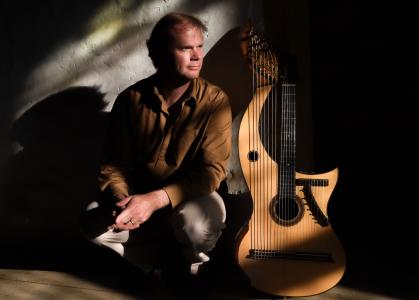
A deserved sell-out audience enjoyed a rare musical treat in the ambient surroundings of the United Reform Church. As Jon explained in his introduction, the harp guitar is a very rare instrument, but one which was in common circulation till the early 20th century before effectively becoming extinct with the advent of electronic amplification.
Jon is a consummate musician who entertained us with an effective mixture of traditional, classical and original compositions. Being such a rare instrument there is obviously a limited repertoire available to the player; in addition to explaining the origins of his instruments he also entertained us with anecdotes regarding the inspiration for his own compositions which mainly seemed to derive from the pleasures and trials of parenthood.
He did comment that Irish melodies sit very well on the harp guitar and the music of John Doan featured strongly. John is one of the very few composers to specialise in the harp guitar and he has dug deeply into his Irish heritage for inspiration.
The harp as an instrument lends itself to dreamlike music and it was fascinating how Jon managed to weave the textures of harp and guitar together. On some pieces it felt like there were two instruments in play whereas on others the sounds emanating from the harp and guitar strings seemed to meld into one. Jon is a sensitive and versatile player; he must also have something of a double track mind to cope with the distinctively different tunings of a harp and and a guitar laid out on a single instrument.
I have no hesitation in recommending this show to lovers of good music.
Fred Rolland
EVENING CONCERT - Emmeline Quartet
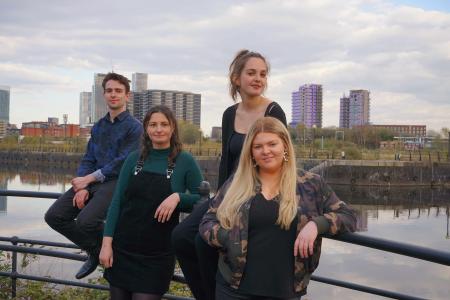
I was lucky to attend a concert at St Mary’s Church on Dale Road given by the Emmeline Quartet. They are a Manchester-based String Quartet and they have taken the name from the famous suffragette Emmeline Pankhurst who was born in Moss Side, Manchester.
In the first half they played Haydn’s String Quartet op 76 no 1 and Janacek’s String Quartet no 1 known as the Kreutzer Sonata after Beethoven’s work. In the second half they played Beethoven’s op 59 no. 2 from the Rasumovsky cycle.
The String Quartet gave the audience information about each piece before they played it.
The Quartet gave a lively and energetic approach to the music they played as exemplified in the sprightly playing of the opening movement of the Haydn and the life-affirming last movement of the Beethoven. The beauty of the Beethoven second movement was conveyed with ease and sensitivity and the character of the lighter movement was expressed in the third movement of the Haydn. This movement marked Minuet could have easily been thought to be an early scherzo of Beethoven. They were able to create suspense and intense passion in Janacek’s work which expressed the emotions of jealous rage.
The masked audience were enthusiastic in their applause.
Roger Horvath
ORCHESTRAL CONCERT WITH SOLOIST - High Peak Orchestra
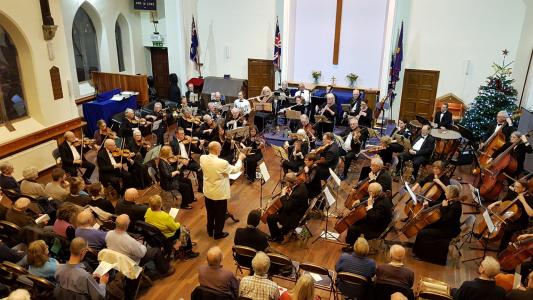
Their first concert appearance for 18 months proved that the High Peak Orchestra had not lost their touch to entertain and enchant. From their base in Whaley Bridge, the HPO have a long pedigree of promoting amateur music-making in the area. Under restrictions imposed in the cause of the pandemic, it is only in the last few weeks that rehearsals have taken place in small groups. It is s a credit to the resilience of the society that with appropriate attention to the Covid regulations, the HPO have pulled together a concert, be it fairly short. The orchestra is of course no stranger to the marvellous acoustics of St John’s Church, and both are regular supporters of the Buxton Fringe.
The concert opened with Elgar’s Serenade for strings in E minor which starts with a relaxing theme which could trigger the emotions of a quintessential English pastoral landscape as a reminder of the movie depictions. The larghetto middle section is more gentle and the even balance of the HPO string section (led by Luke Johnson) provided just the right feel for this piece. The final movement summarises the essence of the work lifting into a major key. It was a pleasure to hear all the moving inner parts so clearly. The rounded intonation from the 4 violas (Kirsten Williams, Nigel Taylor, Heather Hardy and Andrew Hodkinson) and the richness of the cello section (Paul Hickman, Pam Craig, Sarah Crispin and Rosy Hickman) conferred a breadth of sound giving the music a warmth which would be difficult to improve.
For the second piece of the programme the strings stood down as the wind had their turn. Patrick Gundry-White rose from his seat in the horn section to take up the baton. Part of the ‘Sinfonietta for wind instruments’ from the prolific Swiss composer Joachim Raff, the piece, although written in the 1880s is timeless and captures a jocular style and is a wonderful piece for competent wind players incorporating something of equal involvement (and comparable technical difficulty) across all the instruments in the group, rather than just an accompanied solo. We heard some stunning and accurate articulation for the clarinets (Paul Freeman and David Cantillon) and flutes (Kirsty Hetherington and Sue Hardman). The work unfolds into a dialogue amongst the players throwing the themes round the group from bassoons (Simon Roberts and Mike Jagger) to horns (Liz Markman, Sarah Woods and Mark Jeffery) and oboes (Kate Harmey and Karen Stanhope). The conversation develops rather like a committee meeting (on zoom of course!) with the ideas passed around the band. Just when a stated theme is settling into an agreed conclusion, another player interjects with a bolder suggestion, working into a fugue-like development with 2 or 3 themes bobbing round in inversions and variations. The piece develops to an agitated melee before arriving at amicable cadence, beautifully held together by the group. If there was a weak link I didn’t notice it; every player pulling their weight.
Vaughan Williams’ musical setting of the 1881 poem ‘The Lark Ascending’ features a solo violin portraying the lark backed by a care-free landscape of the orchestra. The piece opens with a solo recitative to subtle muted strings laying a rich foundation. Distant replies from clarinet and horn lead to interjections from all parts of the orchestra as the piece broadens but retains a mischievous feel. Clearly the violin solo draws the focus of attention most of the time though it has to be said that the orchestral “landscape” was an absolutely essential ingredient creating a delightful balance.
Tonight’s soloist was Savva Zverev whose childhood was in St Petersburg and is a recent graduate of RNCM. He is clearly in command of his violin and in the cadenzas Savva shows he has the capability of the virtuoso. However there are many nuances of interpretation for pieces such as this popular classic and some needy egotists can get carried away with their position down stage. Not such a trap for Savva, who blends beautifully with the orchestra and his playing is tasteful and understated. In my view this makes for a greater performance and I appreciated the unpretentious warmth he conveyed to the audience. The rapturous applause signalled an encore piece which he delivered in complete contrast on unaccompanied violin. It was more than an impressive technical study demonstrating Savva’s control of tone and tuning across the double stopping in addition to general virtuosity, but his endearing charm engaged us all.
The final item of the concert was the operatic overture to Lucio Silla by Johann Christian Bach, the youngest son of JS Bach. JC Bach spent the latter part of his career in London and was notably influential on the development of innovative musical styles of the 1770’s. The 1st movement of this short overture was played with discipline and imbued with suitable vigour reflecting the operatic action. In the Andante the opening subject is an oboe solo beautifully performed demonstrating masterly control of the instrument which is notoriously difficult to unfalteringly sustain. She produces a sweet rounded oboe tone stating the melodic themes which were gently reflected in clarinets and flutes. The 2nd subject is a little busier and again with effortless brilliance, articulated by the oboist. For the final movements the orchestra nicely encapsulated the operatic style, quite innovative in late 18th century high society. The orchestra was well balanced acoustically in spite of only fielding one double bass (James Banks); the overall effect was most pleasing and the ensemble playing together impressively well coordinated.
The HPO’s principal conductor, David Chatwin, who has been at the helm over the rocky pandemic year presides over a tight knit group of musicians. On this occasion David conveyed an air if reassurance, an atmosphere of inspiration and enjoyment to the appreciative audience of over 120 (suitably distanced). Based on tonight’s performance they are ahead of the game as instrumentalists and collectively the orchestra has a maturity primed to launch into another chapter of a successful concert season.
Brian Lightowler
THE STORY IN THE SONG - Four Tell
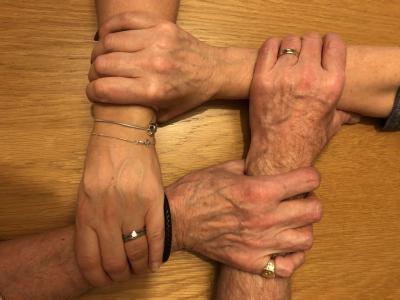
What a joy to spend an evening listening to great singing of wonderful songs! Four Tell had based their set around songs with stories, and although they performed very much in the folk tradition they had cast their net wide for songs.
The show opened with the four part harmonies of “John Ball”, and considering how difficult it has been for the group as a foursome, those harmonies sounded terrific.
After the opening featuring all four performers, the rest of the songs were performed by differing combinations. A beautiful rendition of Bob Dylan’s “You're Gonna Make Me Lonesome When You Go” led by Sarah Owens with Ian Bevan and Ian Bowns on guitar reminded me of how his songs were initially made famous by groups like Peter, Paul and Mary. That was followed by more traditional Davy Cross, sung a capella by Carol and Ian Bowns, a sad story of a young man lost at sea and identified by his woollen gansey, or jumper, knitted by his mother.
Maggie Holland’s “A Proper Sort of Gardener” sung by Sarah Owens was a lovely highlight, and “The Birds will still be Singing” showcased Carol Bowns’ beautiful voice. This was a song originally written and performed by Elvis Costello with the Brodsky Quartet. And indeed, this mix of material was typical of the evening, as amongst the classic folk material from songwriters that were in bands such as Steeleye Span and Pentangle, were songs from more unlikely sources such as Tom Waits, and even Ian Bowns’ version of Van Diemen’s Land by the Edge from U2.
Don’t expect me to tell you much about the Macedonian song with a funny time signature, but it sounded great, and the evening concluded with a reprise of John Ball to popular acclaim.
It was Four Tell’s only performance of the Fringe, but let’s hope we hear them again soon. A lovely evening and the body count wasn’t that high for a folk gig!
Stephen Walker
GUY STEWART SMOOTH & MELLOW SAXOPHONE - Guy Stewart
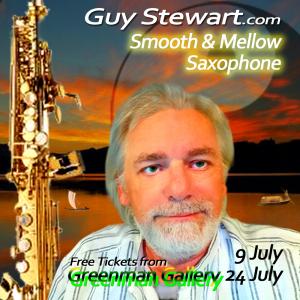
Smooth and Mellow are exactly the right words to sum up Guy's saxophone offering. It was just perfect for a Friday night chilli out with a glass of wine.
The melodic and haunting sounds had me imagining the mist rising over Mam Tor before sweeping me over the Andes to a gentle lilt of imagined pan pipes.
There is no doubting that Guy is an accomplished musician switching between Sax's to bring us sounds from his latest CD Heart To My Soul.
The sometimes poor quality of the wifi connection was unfortunate, and it would have been nice to interact with the performer and to hear Guy introduce his tracks with some background to his inspiration, but hopefully he will return next year for a live show in person.
In the meantime don't miss the chance to catch Guy on 24th July at 9pm online.
Carole Garner
RIK ROBERTS: GUITARIST - Rik Roberts
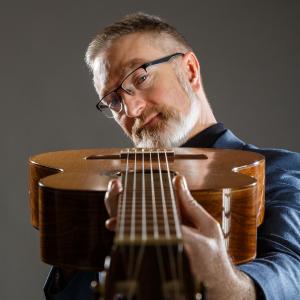
The description of this show promised Classical, Spanish, Jazz, Folk, South American, African, Rockabilly and Bluegrass music and actually delivered most of these, limited only by the time available. Starting with his own instrumental arrangements of two traditional songs, Wild Mountain Time (Will Ye Go, Lassie, Go) and She Moved Through the Fair. Original, but firmly within a traditional format, strongly retaining the melodies, yet with enough progression to draw you in.
Next, two classical/Spanish pieces, Carpricho Arabe (Francisco Tarrega) and Carpricho Catalan (Isaac Albeniz), showed the authentic core of the classical guitarist’s repertoire. Next, and certainly one highlight, two of Rik’s own compositions, Guitar Uganda and Sunbeams, showing his understanding of modern African guitar style. Here, you really could hear something of the tone of African electric guitar, delivered on a classical instrument. Then a sixties medley, followed by a largely improvised piece, Daybreak, inspired by birdsong.
Despite some self-deprecating comments about the limitations of his Jazz playing, he then paid homage to Ella Fitzgerald with a beautiful rendition of The Very Thought of You, before playing his own, very original arrangement of Amazing Grace, which was another highlight for me. He finished with his own version of Elvis’ first hit, That’s Alright.
Whilst there is never really much doubt that a trained classical musician can deliver a range of styles from a technical perspective, the acid test for me is whether they can demonstrate the feel and spirit of each style. Some great players have, in my opinion, struggled at times with music that they no doubt love, but could not quite 'get inside'. Rik’s authenticity was in evidence across the repertoire, and it was good to hear the full range of his skill and musicality.
I think the small audience reflects people’s apprehension regarding returning to live shows, given the experience of the last year or more. It’s good to know that he has another performance later in the Fringe (1pm, 23rd July), which should go into your diary if you missed this time round. Chatting to Rik, his next set will include a lot of different material, and he may again accept requests. All in all, a fabulous way to spend an hour.
Ian Bowns
BROADWOOD PIANO RECITALS - Royal Northern College of Music
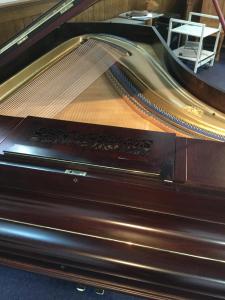
This concert is one of a series where students from the Royal Northern Collage of Music (RNCM) are invited to the URC to play on the Broadwood piano.
This piano was built in 1899 and arrived at the URC many years ago where it was used mostly as a very posh coffee table. Thanks to the generosity of some local benefactors the piano was restored and can now be used by both the local community and young musicians from the RNCM as they start their careers giving concerts in small venues.
The combination of setting, piano and, most of all pianist, made this concert given by Mason Greenwood, a delight. His programme choice of Chopin: Sonata No 2 in B flat, Beethoven: Sonata No 21 in C and Liszt: from Harmonies poetiques et religiouse was entirely appropriate as both Chopin and Beethoven had been given Broadwood pianos. This programme was also appropriate as it enabled Mason to demonstrate his technical ability as well as his ability in infuse emotion into his playing.
Throughout the whole performance Mason demonstrated a good balance between his two hands, each one making its own music and perfectly complimenting the other. This was particularly apparent in the Beethoven Sonata, which is considered one of his most technically challenging pieces and where a dialogue between the hands is a notable feature of the piece.
Mason also played with appropriate emotion. Selecting the well-known funeral march and still managing to make it sound fresh was an accomplishment. He was not afraid to moderate the tempo, slow down for emotional and dramatic effect and then pick up the audience again with more jaunty playing. Although Mason was playing a classical programme there were times when I felt he could turn his hands equally well to playing jazz pieces!
Mason is at the start of his career and commences his graduate training in September. As he becomes more confident Mason’s performance could be further enhanced by the introduction of some interaction with the audience in the form of a few brief words of introduction about each piece. However this was an altogether pleasing performance by an up and coming pianist which was warmly appreciated by a capacity audience. I hope Mason will return to Buxton to play for us again.
It is hoped that the monthly concerts at the URC, where students from the RNCM have the opportunity to play the Broadwood piano, will recommence in September.
If you would like to know more please email: whiteknowle@gmail.com
Viv Marriott
WHEN A PIANO AND A STORY RAN INTO A SONG - Egriega and Ormrod
It really doesn’t get easier to review Pieter Egriega’s gigs. Better to have no preconceptions, approach the whole experience with an open mind and just revel in sharing an insight into a uniquely original creative mind.
‘When a piano and a story ran into a song’ with Pieter and Charles Ormrod is, as Pieter says, a collection of songs and stories which have survived. Like Charles’ keyboard playing - which switches effortlessly from barrelhouse to chamber music, to tango, church organ, and one piece which starts out disconcertingly like Satie’s Gymnopedie - they range widely in style, lyrical and emotional content. Strangely, this does not make them seem disjointed because what binds them together is Pieter’s voice, personality, observation and outlook on life. The whole show is enjoyable, thought-provoking and intelligent. I will just pick out some highlights:
A priest planning a sermon on Saturday afternoon starts as a mono/dialogue with God about whether the theme should be forgiveness to tolerance. Will these go down well with some elements of the congregation? But Alan Bennett certainly couldn’t break into song with the lines ‘Lets give this world another go’, All you see isn’t all there is.’
A tale about how to calm wolves (not advice to be followed rigorously) points out that there are times when we must stand our ground and challenge adversity head-on. This leads into (and I use the term loosely) a song ‘Little Lies’ which includes a burst of scat singing which puts me in mind of George Melly. How on earth did that happen?
Another anecdote comments on the current obsession with recording experiences on smartphones instead of relying on memories and our own emotional internal life. This segues into the song ‘I knew your father before he was a knob’ - which has featured on egriega.co.uk.
There are several lyrical, poetic songs which are rooted in memory, observation and local detail, even at the level of a Stockport bus shelter in 1977 and ‘South Manchester Serenade’ which Egriega says he found by the 192 bus-stop.
By this point I was groping for a way of summing up the show and wrote down the one word - ‘chansonnier’. Later, Wikipedia gave me this: “A chansonnier was a poet songwriter, solitary singer, who sang his or her own songs…Unlike popular singers, chansonniers need no artifice to sing their soul poetry. The themes of their songs varied but included nature, love, simplicity, and a social interest to improve their world”. Could be a good way to sum up Pieter Egriega…
Graham Jowett
SAM DUNKLEY LIVE - Sam Dunkley
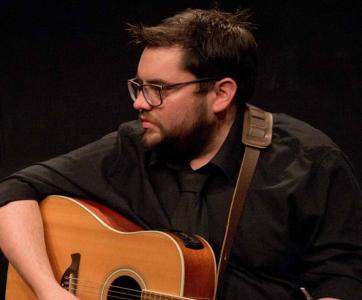
What a joy for one of the Fringe’s favourite sons to be the first live music act of 2021. After a performance lull of 16 months, a new pair of glasses and a few belting new songs about “a difficult year,” Sam learnt that he’s quite good at writing happy songs about people at the most miserable times and wanted to share them.
Performing regularly since 2006, the Fringe just wouldn’t be the same without him.
Sam’s entertainment is funny, engaging, warm and relaxing. His music is mostly self-penned and immersively enjoyable. Some tunes are in the vein of traditional folk, concentrating on hopes, fears, life, death and everything a bit unhappy that lies inbetween. However, Sam generally sings them happier and flexes his lyrical silliness to occasionally poke fun and introduce enthusiastic daftness.
Sadly, current Covid-19 restrictions prevent audience choral participation, so the usual singalong element is temporarily stalled, but don’t let that stop you humming the inviting choruses in unison.
Join in with the relaxed gig feeling at the next opportunity. As Sam said, “Things sometimes feel a bit more normal, this is one of those occasions!”
David Carlisle



